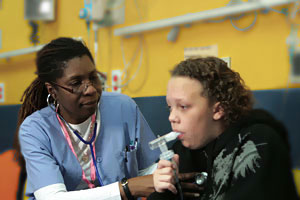Allergy and Immunology
 The Division of Allergy and Immunology at Montefiore offers patients the expertise of our allergists available at one of our three sites. The Division specializes in allergic and immunologic conditions, including:
The Division of Allergy and Immunology at Montefiore offers patients the expertise of our allergists available at one of our three sites. The Division specializes in allergic and immunologic conditions, including:
- Allergic rhinitis
- Asthma
- Atopic dermatitis or eczema
- Food allergies
- Urticaria or hives
- Sinusitis
- Very rare immune deficiencies and immunological problems
We provide our patients with expert diagnoses and aggressive treatment approaches. Rather than simply treating symptoms, we identify the causes of allergies and then develop treatment plans tailored to a patient's individual allergy problem. Our experts regularly appear on year-end lists of the best physicians in the New York metropolitan area, and patients in need of specialized care are often referred to us by their primary care physicians.
Diagnosis
When patients are first referred to us, we diagnose their condition over the course of several visits. To gain a thorough medical overview, our highly trained nurses spend as long as two hours with patients during their initial visit. These examinations often include the following:
- Detailed allergy history, including descriptions of home and work environments
- Dietary history
- Screening allergy skin tests
- Physical examination
- Diagnostic testing including skin tests to identify substances causing allergy symptoms
When necessary, we give additional allergy skin tests until we feel confident that we have found what is causing a patient's allergies. Once patients have been diagnosed, we offer thorough follow-up treatment and complete management of all aspects of their care.
Treatment
Following diagnosis, we use three common treatment methods that are aimed at minimizing the patient's exposure to common triggers of allergies:
- Environment controls: The first line of therapy is identifying the source of each patient's allergies, such as feather pillows, pets and mold. Then, we offer advice to help separate patients from the causes of their problem. For example, if an allergy to latex was found, we may recommend using non-latex rubber gloves. Or if a dietary item is causing an allergy, we will recommend an allergy elimination diet tailored to the patient.
- Drug therapy: Most patients receive various types of medications that alleviate their symptoms and improve their quality of life.
- Allergy shots: Patients will be offered allergy shots if they cannot eliminate allergy-causing substances from their environments or can't tolerate medications. This prolonged course of therapy will minimize the triggers of most allergies and make the patients feel much better. Most patients receive weekly shots for four to five months, followed by monthly injections for another two years. Two nurses specialize in administering the shots. Evening hours are available for the convenience of our patients.
Even when multiple causes are responsible for a patient's allergies, we can devise a highly beneficial course of treatment.
Prevention and Wellness
We help our patients understand how to reduce their symptoms by avoiding exposure to their allergy triggers. Find helpful tips on:
- Controlling allergy triggers such as dust mites and mold
- Avoiding allergens such as pollen when you spend time outdoors
- Managing allergies on vacation
- Using allergy medication wisely
- Easing your child's allergies

Take the Allergy & Immunology Fellowship Program Virtual TourSee why so many applicants choose Montefiore Einstein |



